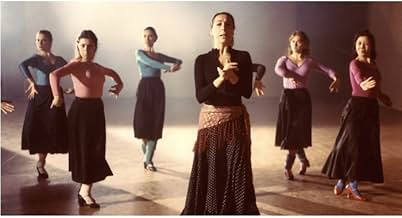In Carmen, Saura once again seeks to establish a dynamic rapport between reality and fiction, between the actual passions of the personalities in a dance company preparing the choreography for the dance portions of the opera Carmen and the scripted passions from the story of the fictional Carmen, the famous fatal mix of a free spirit (read disregard for fidelity) and her ability to drive men mad with desire. Saura used this same vehicle fiction/reality in an earlier black-and-white film, Bodes de Sangre (Blood Wedding). But, whereas the tensions between the dancers rehearsing Blood Wedding showed to advantage how they evolved into the fictional characters of the story to be performed through directing their emotions into their roles, in Carmen, the parallel between the petty, libidinal urges of the dancers of the troop during rehearsals and the spirit forging to do with the mythic Carmen never comes even close to being believable. It remains a gadget, and, for that reason, a bothersome distraction. One really needs to see Blood Wedding next to Carmen to appreciate the comparison. However, it hardly matters, the melodrama Saura tries to impose upon his Carmen, because the Flamenco dancing and guitar music of the rehearsals_ which are 95% of the film _by some of the best known Flamenco dancers and musicians, more than repays the price of entry. A flawed film, and a wonder: perfect for doing a drill in Keats's 'negative capacity', perhaps?























